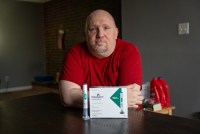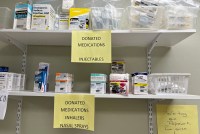Latest KFF Health News Stories
Rural Hospitals Question Whether They Can Afford Medicare Advantage Contracts
Some rural hospitals have canceled — or are considering ending — contracts with insurance companies that offer Medicare Advantage plans, saying the private policies jeopardize their finances and impede patient care.
Can Medical Schools Funnel More Doctors Into the Primary Care Pipeline?
More medical schools say they will no longer charge tuition, in hopes that more students, graduating free of debt, will choose lower-paying primary care careers. But evidence suggests it will take a lot more than a free ride to replenish the primary care pipeline.
Ex-Eye Bank Workers Say Pressure, Lax Oversight Led to Errors
Corneas, the windshields of the eye, are the most transplanted part of the human body. But four former employees at Rocky Mountain Lions Eye Bank told of numerous retrieval problems, including damage to eyes and removal from the wrong body.
Older Men’s Connections Often Wither When They’re on Their Own
Older men who find themselves living alone tend to have fewer close personal relationships than older women. They’re vulnerable, physically and emotionally, but often reluctant to ask for help.
Trump lidera el escepticismo por las vacunas, y el partido lo sigue
Trump ha liderado un cambio radical en la visión de su partido sobre las vacunas, reflejado esta temporada de campaña en afirmaciones falsas de candidatos republicanos durante las primarias y en teorías conspirativas desconcertantes de voces conservadoras prominentes.
Trump Leads, and His Party Follows, on Vaccine Skepticism
Former President Donald Trump has presided over a landslide shift in Republican views on vaccines, reflected in false claims by candidates in election primaries, puzzling conspiracies from prominent conservatives, and a surge in anti-vaccine policies in statehouses.
A Few Rural Towns Are Bucking the Trend and Building New Hospitals
A remote Wyoming community hoped for years to have more access to health care. Now, after receiving federal funding, it is bucking dismal closure trends throughout the rural U.S. and building its own hospital. And it’s not the only one.
Across North Carolina, Medical Debt Exacts a Heavy Toll
The state has among the highest levels of medical debt in the country, data shows.
Décadas de programas nacionales contra el suicidio no han frenado estas muertes
Durante los últimos 20 años, funcionarios federales han lanzado tres estrategias nacionales de prevención del suicidio, incluida una anunciada en abril.
Decades of National Suicide Prevention Policies Haven’t Slowed the Deaths
Despite years of national strategies to address the suicide crisis in the U.S., rates continue to rise. A chorus of researchers and experts say the interventions will work — but that they’re simply not being adopted by state and local governments.
‘Scared to Death’: Nurses and Residents Confront Rampant Violence in Dementia Care Facilities
Clashes between residents — verbal, physical, and sexual — can be spontaneous and too unpredictable to prevent. But the chance of an altercation increases when memory care homes admit and retain residents they can’t manage, according to a KFF Health News examination of inspection and court records and interviews with researchers.
Arkansas Led the Nation in Measuring Obesity in Kids. Did It Help?
For more than 20 years, children in Arkansas have been measured in school as part of a statewide effort to reduce childhood obesity. But the letters have had no impact on weight loss — and obesity rates have risen. Still, the practice of sending letters has spread to other states.
Médicos de atención primaria asumen tareas de dentista para ayudar a pacientes vulnerables
En Denver, la inestabilidad de la vivienda, las barreras del idioma, la falta de transporte y el “costo astronómico” de la odontología sin seguro hacen que la atención dental sea inaccesible para muchos nuevos inmigrantes.
Doctors Take On Dental Duties to Reach Low-Income and Uninsured Patients
More doctors are integrating oral health care into their practices, filling a need in America’s dental deserts.
Montana, an Island of Abortion Access, Preps for Consequential Elections and Court Decisions
A 25-year-old state Supreme Court ruling protects abortion rights in conservative Montana. That hasn’t stopped Republicans and anti-abortion advocates from trying to institute a ban.
Operating in the Red: Half of Rural Hospitals Lose Money, as Many Cut Services
A recent report finds half of America’s rural hospitals are losing money, and many are struggling to stay open. Researchers and advocates worry the hospitals’ financial spiral will have immediate and long-term health effects on their communities.
States Target Health Insurers’ ‘Prior Authorization’ Red Tape
Doctors, patients, and hospitals have railed for years about the prior authorization processes that health insurers use to decide whether they’ll pay for patients’ drugs or medical procedures. The Biden administration announced a crackdown in January, but some state lawmakers are looking to go further.
Programas ponen los medicamentos sin usar en manos de pacientes que los necesitan
Recogen de centros de salud, residentes, farmacias o prisiones los medicamentos sin abrir y sin caducar que se acumulan cuando los pacientes son dados de alta, cambian de medicina o mueren, y los redistribuyen a pacientes vulnerables.
These Programs Put Unused Prescription Drugs in the Hands of Patients in Need
States and counties look to expand programs that accept donations of unused surplus drugs from places like nursing homes and hospitals and redistribute them to low-income and uninsured residents.
Iowa’s Governor Opposes Abortion — And Has Final Say on Whether Medicaid Pays for It
The federal government requires state Medicaid programs to pay for abortions in limited circumstances, but Iowa hasn’t done so for years. No providers seek Medicaid payments, which require the approval of the governor, an anti-abortion Republican.






















